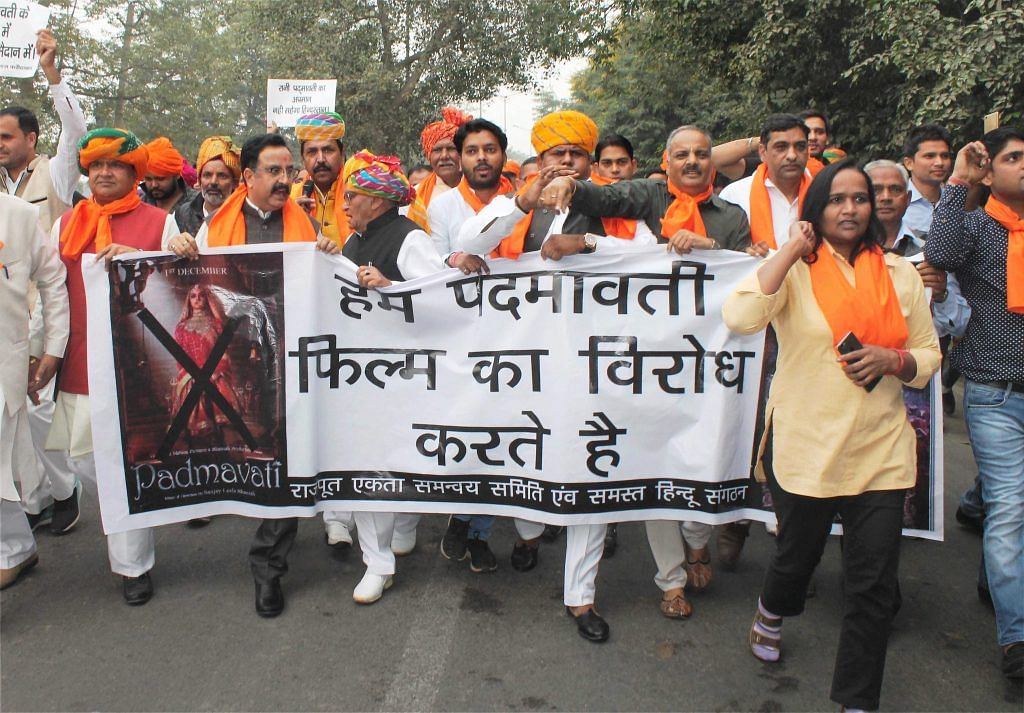Women’s groups have protested against ‘love jihad’ and honour killings, but are strangely silent about the unfettered glorification of ‘jauhar’ in Padmavati.
There is a deafening silence at the heart of the loud and raucous protests against Sanjay Leela Bhansali’s upcoming film ‘Padmavati’. The silence is that of women.
In fact, what is baffling is that women’s groups are focussing on the same phallocentric issue of Padmini’s revered reputation as their male Rajput counterparts. No one seems to want to cry out against a film glorifying the systemic violence inherent in a patriarchal system that foregrounds the necessity of acts like ‘jauhar’ (self-immolation).
‘Love jihad’ and honour killings have seen massive protests in the past, and have even been the subject of films. Isn’t ‘jauhar’ also an attempt to preserve racial purity? It is the noble women and their children that self-immolate. When the men perish, the women and children have no space to inhabit the planet anymore. Outside of the realm of male protection (and validation), their very identity and existence marches with the men on their ‘saka’.
It is honour-killing by another name. So, why is there no outcry?
The dominant protests so far have been about Rajput pride, Padmavati’s alleged dream sequence, and her ghoomar dance.
But the so-called Rajput valour, inherently patriarchal, glorifies this very concept of racial purity and jauhar. Another crucial aspect is that jauhar is committed only when foreign invaders attack (all Muslims, before the British). In that sense, it is a prototype of modern Islamophobia, which now guides the popular rage against racial intermingling
It is crucial to note the narrative that Alauddin Khalji may not only corrupt the Indian land, but also its women, which is why they must perish to protect themselves. The question of honour, for women, has always been intricately linked to their chastity. Men fight wars while women fight battles on their bodies. Jauhar is about preserving this ‘honour’ of a woman’s body, her community, and kingdom.
The threat of rape, that too by a foreign invader, is a fate clearly perceived as worse than death. But that is not a notion that existed just in the 13th century. A few years ago, Sushma Swaraj said after the rape of Jyoti Singh Pandey that a woman is like a living corpse (“zinda laash”) after rape. We have not progressed very well in all these centuries in how we view the woman after rape: ‘victim’ or ‘survivor’.
For the feminist community that rose up in collective anger against ‘sati’ as recently as in the case of Roop Kanwar, this silence is not just disappointing, but crippling. The all-pervasive discourse of community honour has yet again co-opted the conversation about how violence against women is internalised.
The only voice that spoke against jauhar has found little or no traction – a petition filed against its glorification in the Allahabad High Court.
The narratives and collective memory around Padmini have canonised her actions, normalising the institution of jauhar – long after sati has been outlawed. The ‘jauhar kund’ is a place of worship for many natives of Chittorgarh, which sacralises such violence.
If I may borrow from American writer and feminist Betty Friedan, this movie may only help in the creation of an Indian ‘feminine mystique’ that internalises self-sacrifice as an integral part of being a ‘good Indian woman’.
This brings us to the movie’s protagonist Deepika Padukone’s own public persona and voice. Not too long ago, in a short video about empowerment for Vogue in 2015, she said she “feel(s) empowered when you are not caged, when you don’t succumb to expectations”.
It is ironic that Padukone now defends a film grounded in expectations of a male society that believes female identity may never exist without its men.
Another actor in the film, Shahid Kapoor, said about the protests: “We need to look deep within as a society, as a country, as a people, where are we headed.”
But the problem on our hands is not just that Padmini performed ghoomar.
